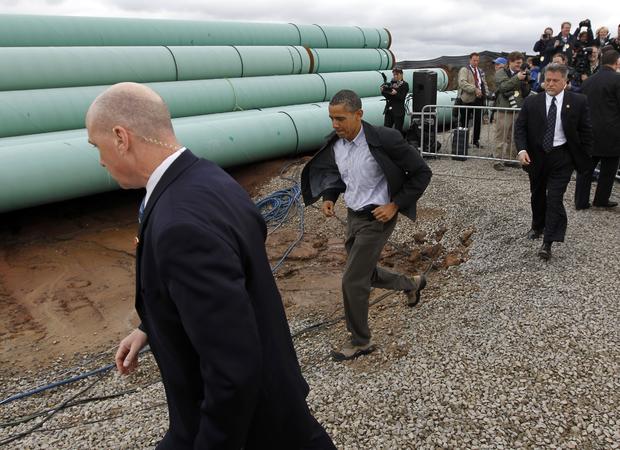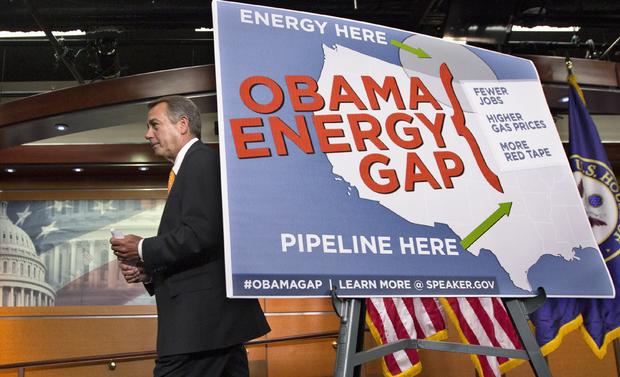Keystone controversy continues as Obama visits Cushing
The first leg of the Keystone XL oil pipeline is slated for construction, and President Obama on Thursday sought to remind voters he backs at least this portion of the controversial project.
"Producing more oil and gas here at home has been, and will continue to be, a critical part of our all-of-the-above strategy," Mr. Obama said from Cushing, Oklahoma, the site where the Southern portion of the pipeline will begin construction.
That has not stopped Republicans from attacking Mr. Obama for failing to embrace the cultivation of domestic oil resources. And as new evidence shows the public getting behind the project, environmentalists are desperately calling on the administration to slow down and consider what they say will be disastrous environmental and economic risks that come with putting a pipeline directly through the Midwest's agricultural base.
Mr. Obama stopped in Cushing as part of a two-day tour touting his energy policies. The stop gave the president a prime photo opportunity among pipes in TransCanada Pipe Yard -- evidence he's attempting to pursue his "all-of-the-above" energy strategy amid rising gas prices.
TransCanada Corporation first proposed the Keystone project in 2005. The 1,700-mile underground oil pipeline would link the tar sands fields of northern Alberta to oil refineries on the Texas Gulf Coast. The full project needs executive approval since it crosses international boundaries. Republicans tried to pass legislation late last year to expedite the process, but Mr. Obama rejected it to give the State Department more time to review the project's potential impact.
A new Gallup poll, conducted March 8-11, suggests the president's memo may be the right political move -- 57 percent of Americans think the full pipeline should be approved while just 29 percent think it shouldn't.
Still, by supporting the pipeline the president risks angering the liberal base and those concerned with its environmental impact. Last year, tens of thousands of people objecting to the pipeline protested in Washington against its approval.
Yesterday in Nevada, Mr. Obama maintained, "As long as I'm president, I will not walk away from the promise of clean energy." He said opponents of clean energy investments amounted to "charting members of the Flat Earth Society."
But today's stop in Cushing has environmentalists concerned the president may be giving in to those very forces he belittled yesterday. Susan Casey-Lefkowitz of the Natural Resources Defense Council this week specifically criticized the president's support for the Southern leg of the pipeline.
"It is downright foolhardy to cut corners on safety reviews for permitting the southern segment of the Keystone XL tar sands pipeline - especially when the industry has a history of oil spills," she said in a statement. "We already know from experience that tar sands oil is more likely to spill and harder to clean up once it spills. The people of Oklahoma, Texas and the rest of the country deserve better."
Southern leg of Keystone pipeline a "priority," Obama says
Obama: I won't walk away from promise of clean energy
Face the facts: A fact check on gas prices
Environmentalists feverishly point to 2010's Deepwater Horizon disaster, the worst oil spill in U.S. history, as an example of what happens without proper oversight of the oil industry. To further make their case, they're pointing to the 2010 million-gallon spill in Michigan's Kalamazoo River, which showed that tar sands oil spills can be especially challenging to recover from -- parts of the river are still closed as clean up continues.
The National Wildlife Federation argues the Keystone project should at least wait until the Pipelines and Hazardous Materials Safety Administration finishes an ongoing study on tar sands pipelines.
While opposition to the project from environmentalists is fierce, Republicans have just as enthusiastically called for its approval.
The State Department estimates Keystone could create 5,000 to 6,000 jobs, though other analysts give a lower number -- the Cornell University Global Labor Institute that found up to 1,400 temporary construction jobs would be created. Still, conservatives are citing estimates that the project would create 20,000 jobs, coming from the U.S. Chamber of Commerce and the Canadian ambassador to the United States.
In addition to creating much needed jobs, backers of the pipeline say it would boost North American energy production. Lucian Pugliaresi, president of the Energy Policy Research Foundation, told a congressional committee that the pipeline is needed because "chokepoints in domestic crude transportation infrastructure are now so severe that they are threatening North American petroleum production."
And by approving this project, proponents argue, the energy markets would be encouraged to expand domestic production. "We are no longer arguing over a few hundred thousand barrels/day of new production but the opportunity for a transformation of the American economy," Pugliaresi said.
By approving the Keystone pipeline, "we can truly have a policy that gains U.S. North American energy independence," Republican Sen. Lisa Murkowski of Alaska said Thursday. "If we're able to access resources up in the North -- in Alaska, in the Rockies -- it is in range. But it's not in range if you pick and choose" which energy sources to pursue.
Mr. Obama has said he's for an "all-of-the-above" energy strategy, but Republican Sen. John Thune of Nebraska said today, "Actually, he's only for '29 percent of the above,'" referring to the fact that the Cushing leg of the TransCanada project only represents 29 percent of the Keystone pipeline.
"Ironically, [he supports] the 29 percent that doesn't connect to the energy source," Thune added.
The Republican National Committee has dismissed Mr. Obama's stop in Cushing today as a "stunt," as have his potential Republican presidential opponents.
"He's going to build a pipeline -- the Southern half of the Keystone pipeline," Mitt Romney said this week. "It's kind of like the Bridge to Nowhere -- it doesn't connect to Canada, it's just down South. So if his poll numbers go a little lower, of course we'll be able to get the other half."

